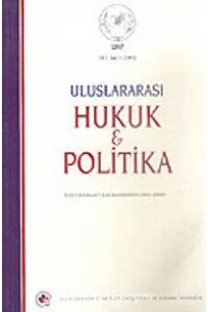A new authority emerging out of harmonization needs: Is BEREC the right solution for European eCommunications market?
Uyumlaştırma İhtiyaçları Neticesinde Ortaya Çıkan Yeni Bir Kurum: Avrupa Elektronik Haberleşme Pazarı için BEREC Doğru Bir Çözüm mü?
___
- Andriessen, J. H. Erik and Robert, Roe A. (ed.), Telematics and Work, (Sussex-. Hove Publications, 1994).
- Burkert, Herbert The Post-Deregulatory Landscape in International Telecommunications Law: A Unique European Union Approach' Brooklyn Journal of International Law, XXVII: 3, 2002, p. 739-816.
- Cave, Martin E.- Majumdar, Sumit K. and Vogelsang, Ingo, Handbook of Telecommunications Economics, Volume 1, (Amsterdam: NH Elsevier Science B.V., 2002).
- Directive 2009/140/EC of the European Parliament and of the Council of 25 November 2009 amending Directives 2002/21/EC on a common regulatory framework for electronic communications networks and services, 2002/19/EC on access to, and interconnection of, electronic communications networks and associated facilities, and 2002/20/EC on the authorisation of electronic communications networks and services ("Better Regulation Directive"), 18.12.2009, OJ L 337/37, Recital 27, http://eur-lex.europa.eu/LexUriServ/LexUriServ.do? uri=OJ:L:2009:337:0037:0069:EN :PDF, (accessed: 16.09.2010).
- Directive 2009/136/EC of the European Parliament and of the Council of 25 November 2009 amending Directive 2002/22/EC on universal service and users' rights relating to electronic communications networks and services, Directive 2002/58/EC concerning the processing of personal data and the protection of privacy in the electronic communications sector and Regulation (EC) No 2006/2004 on cooperation between national authorities responsible for the enforcement of consumer protection laws, ("Citizens' Rights Directive"), 18.12.2009, OJ L 337/11, http;//eur-lex.europa.eu/LexUri Serv/LexUriServ.do?uri =C>J:L:2009:337:0011:0036 :En:PDF, (accessed 16.09.2010).
- Directive 2002/21/EC of the European Parliament and of the Council of 7 March 2002 on a common regulatory framework for electronic communications networks and services ("Framework Directive"), OJ 24.4.2002, L 108/33, http://www.europa.eu.int/inf ormation_society/topics/telecoms/regulatory/new_rf/index_en.htm#reg, (accessed 16.09.2010).
- Directive 2002/21/EC of the European Parliament and of the Council of 7 March 2002 on a common regulatory framework for electronic communications networks and services ("Framework Directive"), OJ 24.4.2002, L 108/33, http://eur-lex.europa .eu/LexUriServ/LexUriServ.do?uri=OJ :L: 2002:108:0033:0050: EN: PDF, (accessed 16.09.2010).
- European Commission, Recommendation of 11/02/2003 on Relevant Product and Service Markets within the eCommunications Sector Susceptible to ex ante Regulation, http://ec.europa.eu/information_society/topics/telecoms/regulatory/maindocs/docum ents/recomen.pdf, (accessed: 16.09.2010).
- European Commission, Communication from the Commission to the Council, the European Parliament, the European Economic and Social Committee and the Committee of the Regions on the Review of the EU Regulatory Framework for Electronic Communications Networks and Services, Brussels, 29.6.2006, COM(2006) 334 final, http://eur-lex.europa.eu/LexUriServ/site/en/ com/2006/com2006_0334en01.pdf, (accessed: 16.09.2010).
- European Commission, "Growth, Competitiveness, Employment: The Challenges and Ways Forward into the 21st Century' White Paper COM(93) 700, December 1993.
- European Commission, Impact Assessment (IA), COM(2006) 334 Final, SEC(2006) 817, Brussels, 28.06.2006,
- http://ec.europa.eu/information_society/policy/ecomm/doc/info_centre/ public_consult/review/impactassessment_final.pdf, (accessed: 16.09.2010).
- European Commission, Staff Working Document, COM(2006) 334 Final, SEQ2006) 816, Brussels, 28.06.2006, http://ec.europa.eu/information_society/policy/ecomm/doc/info _centre/public_consult/review/staffworkingdocument_final.pdf, (accessed 16.09.2010).
- Forrester 1. S., Ian S. and Keegan S. Sandra., "The Tension between Regulation and Competitive Market Forces In Europe', Tulane European and Civil Law Forum, Vol. 21, No. 125, 2006, p. 125-145.
- Marcus, J. Scott "The Potential Relevance to the United States of the European Union's Newly Adopted Regulatory Framework for Telecommunications', journal on Telecommunications & High Technology Law, Vol. 2, Issue 1, Fall 2003, http://www.jthtl.org/content/ articles/V2Il/JTHTLv2il_Marcus.PDF, (accessed: 16.09. 2010), p. 111-140.
- Regulation (EC) No 1211/2009 of the European Parliament and of the Council of 25 November 2009 establishing the Body of European Regulators for Electronic Communications (BEREC) and the Office, http://eur-lex.europa.eu/LexUriServ/LexUriS erv.do?uri=OJ:L:2009:337:0001:0010:EN:PDF, (accessed: 16.09.2010).
- Selvadurai, Niloufer 'The Regulation of the Information Society in The European Union', Computer and Telecommunications haw Review, Vol. 10, No. 4, 2004, p. 130-136.
- Web Sites (accessed 16.09.2010):
- http://ec.europa.eu/information_society/policy/ecomm/doc/info_centre/public_consult/re view/impactassessment_final.pdf
- http://ec.europa.eu/information_society/policy/ecomm/tomorrow/index_en.htm
- http://ec.europa.eu/information_society/policy/ecomm/library/ext_studies/index_en.htm #2006
- http://erg.eu.int
- http://ec.europa.eu/information_society/policy/ecomm/library/public_consult/past/index en.htm#review.
- ISSN: 1305-5208
- Yayın Aralığı: 5
- Başlangıç: 2018
- Yayıncı: Uluslararası Stratejik Araştırmalar Kurumu
ABD'nin Afganistan politikasının açmazları: Bölgesel bir analiz
Dış politikada süreklilik-değişim çekişmesi
Avrupa Birliği birincil hukukunda azınlıkların korunmasının hukuki dayanağı
Democracy in the European Union from the perspective of representative democracy
Avrupa Birliği adalet divanı içtihadı ışığında serbest dolaşım ve birlik yurttaşlığı
